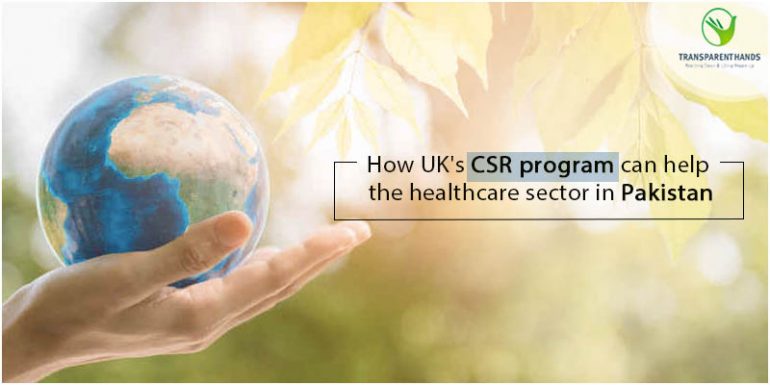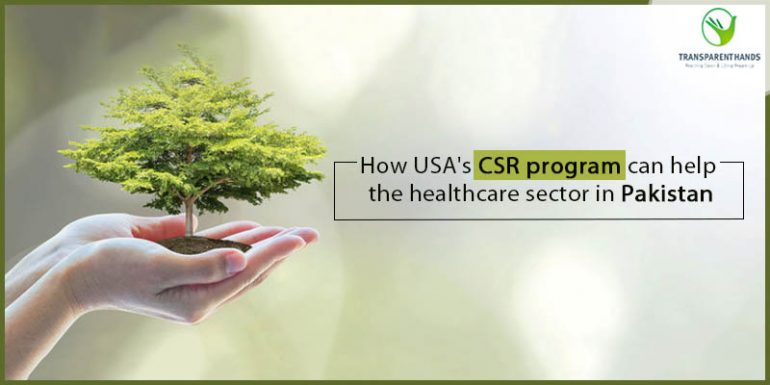How UK’s CSR Program can help the Healthcare Sector in Pakistan

The expansion of bigger companies is making the rich ever richer while new fortunes are being created faster every day. Some of these super rich companies have figured out that with a lot of money, they are obliged to perform a lot of responsibilities towards the community. As CSR has become an integral part of the business, now everybody is setting foot in the business of giving. How UK’s CSR Program can help the Healthcare Sector in Pakistan.
CSR in the UK :
The UK Corporate Governance Code is specifically not concerned with CSR but there is some resonation that a company’s duties must extend beyond its share shoulders.
The Supporting Principals of Corporate Governance Code of UK states: “The board should set the company’s values and standards and ensure that its obligations to its shareholders and others are understood and met.”
-> How USA’s CSR Program Can Help HealthCare Sector in Pakistan

Moreover, the Turn Bull Guidance, which is a subordinate to the code states: “Risk assessment should cover not only narrow financial risks but also those related to health, safety and environmental, reputational and business probity issues”
CSR is seen as part of best practice increasingly in the UK. Companies are eager to talk about social and environmental issues in their annual reports openly. Complying CSR guidelines with business, has become a commercial necessity now. For bigger companies, in particular, CSR can be argued as not an add-on or optional extra; it is an integral part of good governance.
Having said that UK companies are extending their CSR programs, not only in their localities but also around the globe and contributing to various sectors like healthcare, environment, education etc.
Glaxo SmithKline (GSK) in Pakistan:
Glaxo SmithKline (GSK) is a British pharmaceutical company which is operating in Pakistan since 2001, contributing to its healthcare sector. GSK Pakistan operates mainly in two industry segments: Pharmaceuticals (prescription drugs and vaccines) and Consumer Healthcare (over the counter medicines, oral care, and nutritional care). GSK Pakistan is a successful business in the healthcare sector with almost 10.3% of the value share and over 17% of the volume shared in Pakistan’s pharma market.
How UK’s CSR Programme facilitate Healthcare Sector in Pakistan:
Access to healthcare facilities,it is the basic right of every citizen but unfortunately, the government of Pakistan has failed over the decades to fulfill its commitment to the health sector. The government was criticized for investing its limited resources in the development of medical colleges and universities rather than investing in improving the quality of healthcare by training medical professionals.
According to a report published by The Dawn, infant mortality rate in Pakistan is 66 per 1,000 births compared to 38 in India and 8 in Sri Lanka. Life expectancy in Pakistan for women is 67 years, as compared to 73 in Bangladesh and 78 in Thailand. The maternal mortality rate in Pakistan is 170 per 100,000 live births, in contrast to 30 in Sri Lanka and 20 in Thailand.
It is very much encouraging that during the year 2014, the national health expenditure has increased by 28.78 percent, which is an indicator that the government is making best efforts to provide better health facilities to the general public.
Big Companies like the GSK took up the opportunity of expanding healthcare sector of Pakistan and eventually their businesses are flourishing. There are total 660 registered Pharmaceutical companies in Pakistan, amongst which Multinational Pharmaceutical Companies operating here are only 18. The estimated Pharma market size in Pakistan is USD $2.6 Billion making it the 7th most attractive market in Asia.
The CSR programme of Glaxo SmithKline has had a positive impact in the healthcare sector by investing in health and educational programs and partnerships with organizations that strive to bring value to the communities they work for. Their CSR programmes have brought sustainable improvements in the lives of the underserved people of the developed and underdeveloped world.
GSK has donated medicines worth over half a million rupees as aid victims for the nationwide heat wave, during the holy month of Ramadan in 2015. GSK has also launched a programme called “Zero waste with an innovative approach” to save marine life from the verge of extinction by reducing the number of pollutants entering the ecosystem, placing the well being of all living species first while achieving their objectives.
According to Pakistan’s Investor Guide (2014 – 2015), the healthcare spending in Pakistan was projected to be PKR 521.91 billion ( USD 5.59 billion) in 2013. In 2017 this spending was projected to be PKR 986.53 billion (USD 9.2 billion) respectively.
The shortage of trained health workers and the rising population pressure on public health institutions has allowed the private sectors to bridge the demand and supply gaps. Pakistan’s rapidly growing population, patients, greater awareness on health matters and lack of maintained infrastructure in public sector should be considered an asset, placing high preference and need for the development of healthcare services. Therefore foreign investments in the healthcare sectors are warmly welcomed in Pakistan.
The Government of Pakistan offers various incentives to attract foreign investment including full repatriation of capital, capital gains, dividends, and profits. Pakistan Investigator Guide (2014 – 2015) reported Pakistan has the most liberal investment policy regimes and public-private partnership frameworks in entire South Asia.
Conclusion
CSR is not without critics. Many argue the purpose of business should be only business. The business of civics is for the government. However, gone are those days when we could simply overlook the importance of CSR.
Eamonn Butler, Director of the Free Market Economics of the Adam Smith Institute admitted: “Business, in general, is highly responsible and they have to sell goods, hire people in their local community and have to maintain workers. Therefore most companies do recognize the responsibilities they have offer to wider public”
The UK Cards Association, a trade body for the card payment’s industry, stated: “CSR is about understanding the business impact on the wider world and how we can leverage this impact in a positive way. It is essentially an umbrella term to encapsulate how we impact and engage with the environment, employees and the community.”










Leave Your Comments